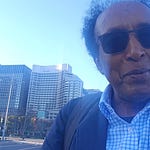Before I share my thoughts on Somalia’s past giant diplomats, allow me to digress. I want to share this video with you from 12 October 1979, almost 45 years ago today, the following speech was delivered by one Fidel Castro of Cuba, forgive me but I have to write this: plus ça change, plus c'est la même chose. Peace and justice for all.
Fast forward 45 years… and onto Somalia, and brief(est) history of its diplomacy. Am in Jakarta and found this historical piece in a hotel basement.
Somalia's diplomatic history and its diplomats have played pivotal roles in shaping the nation's global engagement, particularly amid decades of political instability and civil strife. As a member of the United Nations since 1960, Somalia has sought to maintain an active diplomatic presence, promoting regional stability, peacebuilding, and development. Notable Somali diplomats, such as Abdulrahim Abby Farah, Omar Arteh Ghalib and Abdullahi Sheikh Ismail, have significantly contributed to the country's international presence.
Abdulrahim Abby Farah, a prominent figure, served as Somalia's Permanent Representative to the United Nations and was a notable advocate for African decolonization during the 1960s and 1970s. His efforts were instrumental in shaping the UN's policies on apartheid in South Africa, where he played a leading role in the anti-apartheid debates. Farah’s tenure at the UN also included a presidency of the United Nations Security Council, where he leveraged his position to address issues pertinent to Africa and the broader international community, advocating for human rights and conflict resolution.
Somalia has maintained a historically significant and evolving diplomatic role on the global stage, characterized by its strategic geopolitical position in the Horn of Africa. Somali diplomats have navigated complex international relations, contributing to regional and global governance, particularly through organizations such as the Non-Aligned Movement (NAM), the African Union (AU), and the Arab League. The country's diplomatic efforts have been shaped by its internal political dynamics, as well as regional and international partnerships, with prominent figures such as Omar Arteh Ghalib and Abdullahi Sheikh Ismail playing key roles in shaping Somalia’s foreign policy.
Somalia's diplomats have consistently promoted a foreign policy of neutrality and non-alignment, aligning the nation's interests with countries pursuing independence from Cold War superpower influence. As an active NAM member since its inception in the 1960s, Somalia sought to maintain sovereignty while advocating for decolonization and economic development across the African continent. Somali representatives, such as Omar Arteh Ghalib, who served as Foreign Minister, articulated the country’s stance on non-alignment, contributing to dialogue on global peace, anti-imperialism, and self-determination. Key figures such as Abdullahi Sheikh Ismail, who served as Deputy Prime Minister and Minister of Foreign Affairs, have been instrumental in advancing Somalia's interests within the AU, particularly during the post-conflict reconstruction phases.
The legacy of Somali diplomats such as Omar Arteh Ghalib and Abdullahi Sheikh Ismail illustrates the nation's commitment to shaping international discourse while addressing domestic challenges. Omar Arteh Ghalib’s tenure in government reflected Somalia’s proactive engagement in global diplomacy, while Abdullahi Sheikh Ismail’s contributions highlighted the strategic use of diplomatic platforms for national development. Together, they represent Somalia’s enduring pursuit of diplomatic balance amidst shifting global dynamics, contributing to a legacy of non-alignment, African solidarity, and Arab unity.
Through its participation in the Non-Aligned Movement, African Union, and Arab League, Somalia continues to navigate a complex diplomatic landscape, striving for peace, sovereignty, and regional cooperation. Its diplomats, often working under challenging circumstances, embody the country’s aspiration to maintain an influential voice in global affairs, despite its internal struggles.
Comments, feedback as always welcome.













Share this post